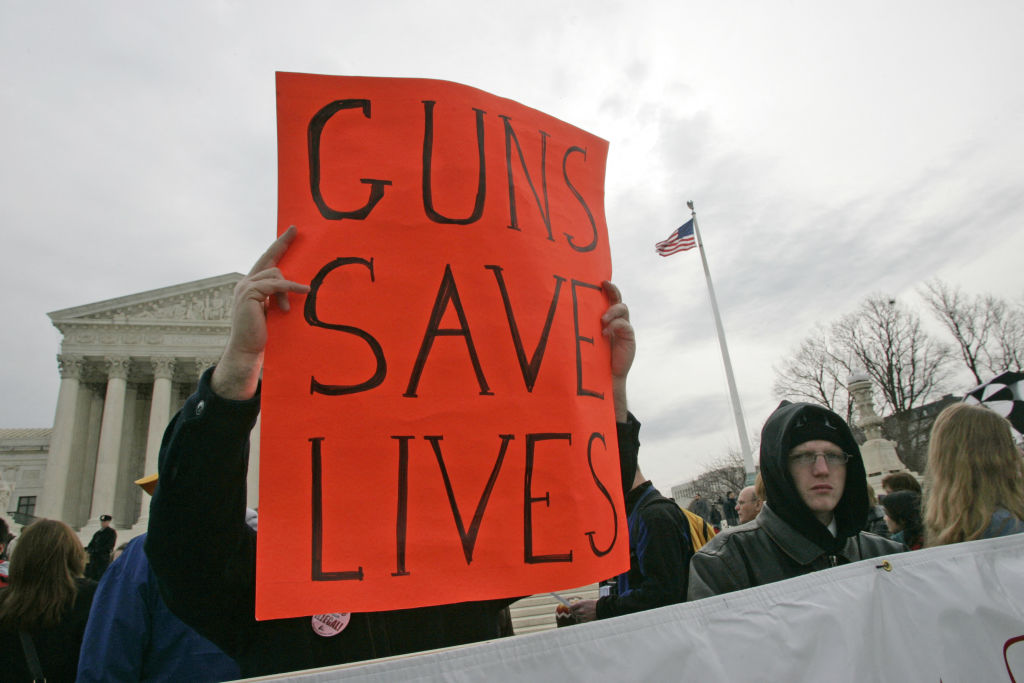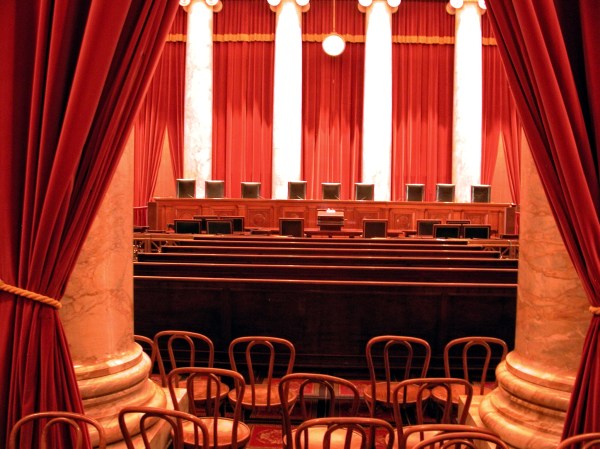Over the coming months, you can expect to hear a great deal about United States v. Rahimi, the most important Second Amendment case that the Supreme Court will hear in its next term. And what you will hear is that this is a case about whether we take domestic violence seriously.
It isn’t. It is a case about whether we take due process seriously.
Sometimes, it is easier to understand disputes about the Second Amendment if you pretend that they are disputes about the First Amendment. The fact is that many of our progressive friends do not think the Second Amendment should be in the Bill of Rights and do not consider Second Amendment rights true and legitimate civil rights. But if Second Amendment rights can be taken away simply because the right kind of people demand it, then so can the rights protected by the First Amendment, the Fourth Amendment, or any other part of the Constitution. And that is what really is at stake in Rahimi.
Zackey Rahimi is, by all accounts, a real piece of work—“hardly a model citizen” as the Fifth Circuit Court of Appeals put it in an appellate opinion vacating Rahimi’s conviction on a federal gun charge. He seems to have been involved in at least five shootings over the course of a few weeks and was accused of assaulting a girlfriend, among other misdeeds. He loves to shoot his guns: He got into a car wreck and shot at the other driver; he shot at a constable’s car; he threw a fit and started firing off a pistol when his buddy’s credit card was declined at a Whataburger. (This is, to be sure, a Texas story.) If the facts of the case are as they appear—and there is no serious reason to think otherwise—the guy not only has no business owning a firearm, he has no business walking around in the sunshine as a free man.
Here’s the thing: Rahimi has never been convicted in any of those instances of criminal gunplay. Nor has he ever been convicted of any crime of domestic abuse. The only mark on his criminal record is a misdemeanor marijuana charge from an arrest shortly after his 18th birthday. Rahimi entered into a voluntary deal—as part of a civil process, not a criminal case—in which he agreed to a protective order barring him from contact with the former girlfriend who accused him of having assaulted her. (Again: There isn’t any reason to doubt that he did, in fact, assault her, but he has neither been charged with doing so nor convicted of any crime in the matter.) Under federal law, people subject to such protective orders are not allowed to purchase or possess firearms. The language of the statute is very precise, applying its prohibition to a person:
… who is subject to a court order that was issued after a hearing of which such person received actual notice, and at which such person had an opportunity to participate; restrains such person from harassing, stalking, or threatening an intimate partner of such person or child of such intimate partner or person, or engaging in other conduct that would place an intimate partner in reasonable fear of bodily injury to the partner or child; and includes a finding that such person represents a credible threat to the physical safety of such intimate partner or child; or by its terms explicitly prohibits the use, attempted use, or threatened use of physical force against such intimate partner or child that would reasonably be expected to cause bodily injury.
Many of the criteria under which a U.S. citizen can be prohibited from purchasing or possessing a firearm involve some kind of legal process: A citizen can be prohibited from owning a firearm after being convicted of a felony or certain misdemeanors, including domestic violence misdemeanors; a person can be prohibited if he is under indictment for such a crime but has not been convicted; a person can be prohibited because he has been adjudicated to be mentally incompetent; a person can be prohibited because of a dishonorable discharge from the armed forces. But a person can be prohibited for other reasons, too, reasons that do not involve courtroom standards: if he is a drug addict or an unlawful drug user, even if he has not been charged with a crime; if he is illegally present in the United States or is an alien lawfully present through a nonimmigrant visa. It is unlawful for a minor to purchase a firearm, and illegal to purchase a firearm on behalf of a prohibited party.
There are a lot of different kinds and levels of legal process involved in those prohibitions—due process is not universal but is the process that is due, or obligatory, for a particular situation. The gold standard, in this context, is a criminal conviction. People lose their constitutional rights and political rights (such as the right to vote) after felony convictions pretty commonly. That can include losing not only the right to keep and bear arms but also First Amendment rights: Cybercriminals and traffickers in child pornography, for example, are sometimes prohibited from using the internet or have very strict limitations on their use of communication technology. Felons may also lose their Fourth Amendment rights, for some period, as parolees are subject to intrusive searches that other citizens are protected from.
A citizen’s rights can be curtailed, at least for a time, without a criminal conviction: People under indictment may lose their Second Amendment rights for a time, may have their travel restricted, etc. The process by which someone is judged mentally incompetent or is involuntarily committed to a mental institution can vary a good deal, and the matter will go before a judge, but it is not as burdensome a process for the state as obtaining a criminal conviction. There isn’t any necessary judicial process for declaring a minor a minor or an illegal alien an illegal alien, and restricting minors and noncitizens is a longstanding and generally uncontroversial fact of American legal life. Being a drug addict isn’t really a legal status at all, or even a medical one, in the sense that a drug addict is a drug addict irrespective of whether a doctor has judged that he is addicted in a medical sense.
I know that my progressive friends do not like to think of Second Amendment rights as civil rights, but that is what they are under our constitutional order. To secure these rights in an explicit way is why we have a Bill of Rights. The due process involved in securing a felony criminal conviction is not the only level of protection that may be appropriate in these cases. Yet we should be very, very careful when it comes to curtailing the rights of people who have not been convicted of a crime or, in many cases, even charged with one or even under investigation for one. Remember the post-9/11 issues with people being put on no-fly lists simply for having the wrong kind of name. (“Muhammad” was by far the most common name on the leaked no-fly list, which placed prohibitions on travelers as young as 4 years old and on others more than 100 years of age.) The precedent we set for the Second Amendment is going to affect how we look at the First Amendment, the Fourth Amendment, and the rest of the Constitution.
What is at issue in Rahimi is whether it is constitutional for the federal government to suspend the Second Amendment rights of a citizen who has not been convicted of a crime, who has not been charged with a crime, and who does not even face the possibility of being charged with a crime in the case of a civil matter. Zackey Rahimi has since been charged with other crimes, but the only crime with which he was charged in the matter in dispute was possessing a firearm while under a protective order stemming from a noncriminal proceeding. It may very well be the case that Rahimi should have been charged with domestic violence—and much else—but he wasn’t.
Rahimi’s conviction originally was upheld by the Fifth Circuit, but then it was overturned in a subsequent challenge following the Supreme Court’s Bruen decision. It is not—not!—the case that, as one writer put it in Slate, “since the Founding Fathers hadn’t specifically mentioned domestic violence, they argued, domestic abusers should be free to own the weapons of their choice.” That, from a piece by Abigail Esman, is incompetent journalism, positively wrong on the facts—but you should expect to see a lot of that, too.
What the court actually held in Rahimi has very little to do with how domestic violence was treated in the 18th century. Instead, the court asked the government to show under what precedent it assumed the powers to set aside the constitutional rights of a citizen “when the individual has not been criminally convicted or accused of any offense and when the underlying proceeding is merely civil in nature.” The court wrote:
To [the federal law’s] burden on Rahimi’s Second Amendment right, the Government bears the burden of proffering “relevantly similar” historical regulations that imposed “a comparable burden on the right of armed self-defense” that were also “comparably justified.” And “when it comes to interpreting the Constitution, not all history is created equal. Constitutional rights are enshrined with the scope they were understood to have when the people adopted them.” … We thus afford greater weight to historical analogues more contemporaneous to the Second Amendment’s ratification.
There are longstanding precedents for suspending various rights of people who have been convicted of crimes or, temporarily, those of defendants who are awaiting trial, just as there are longstanding precedents for limiting the rights of minors, people in military service, etc. But what about citizens who haven’t been convicted or charged with a crime, or subjected to some careful legal process such as that involved in declaring someone mentally incompetent? In Rahimi’s case, there wasn’t even a formal hearing, and Rahimi did not have the benefit of legal counsel in the matter. Judges are notoriously promiscuous when it comes to protective orders; some years ago, a woman who said David Letterman was harassing her via coded messages in his television program sought a protective order against him—and was given it, at least until it was quashed later by another judge. Protective orders issued on flimsy pretexts are pretty standard fare in divorce and custody cases, and in some other kinds of litigation. In Texas, protective orders typically last for two years, but a judge can, at his discretion, impose a permanent—lifetime—restraint.
The government’s attempt to defend the law in this case relied on a number of very weak historical precedents, including laws that were used to disarm Native Americans and African Americans on the theory that these groups of people were simply too dangerous to be trusted with the same firearms that white men might keep and bear. The government even cited the campaigns of British monarchs to disarm their political opponents as precedent—tyrannical actions that produced the very measures in the 1689 English Bill of Rights that inspired the Second Amendment—i.e., the government tried to justify gutting the Second Amendment by citing precisely the royal abuses that led to the Second Amendment’s being adopted in the first place. That kind of lawyering seems to me almost as incompetent as Slate’s journalism. Finding no justification for the law in the Constitution itself or in our legal history and tradition, the court ruled that, under the Bruen standard, the law in question is unconstitutional.
A few thoughts.
First: I am not sure that the law in question ought to be ruled unconstitutional as a legal matter. About that, The Dispatch has many better-informed writers than me. I will repeat, however, that there are different levels of protection at work here, from the high level of protection afforded to criminal defendants to the lower level of protection offered to other kinds of prohibited parties. If a protective order is produced by a hearing in front of a judge, affords the restricted party some kind of legal defense and the possibility of appeal, and comes with a relatively brief expiration period (say, one year or less), then I think gun temporary prohibitions based on such an order are probably defensible as law, certainly as policy. I also tend to take a more federalist view of gun rights than many of my fellow gun rights advocates: I do not see any constitutional or prudential reason that the gun laws in midtown Manhattan have to be exactly the same as those in rural Wyoming, much as regulations touching free speech rights (e.g., rally permits and parade rules) vary substantially from location to location, taking into account local conditions while operating within the confines of the First Amendment.
Second: I know that I am a bore on the need to enforce the laws we have on the books rather than look for new ways to encumber the Second Amendment, but this is a textbook case. This goon is shooting off guns all over town, and there were ten different ways to lock him up without even brushing up against the Bill of Rights—for example, it is illegal to shoot people, to shoot at people, and to shoot in protest of being denied a meal at Whataburger. We have laws—criminal laws—against domestic violence. Police say they believe Rahimi is a drug dealer linked to any number of violent crimes, but they never got around to charging him with much—or, prior to the matter in question, convicting him of anything other than the teenage marijuana misdemeanor—before somebody literally made a federal case out of it. A lot of taxpayers in and around Tarrant County, Texas, should be asking what in the heck their money is being used for.
Third: There is, beyond the formal legal question, a civic question. And that is the one that interests me most: What kind of society do we want to have? Obviously, we want to be a society in which it is very difficult for goons to get their hands on weapons. We want to be a society that takes violence against women seriously. But we also want—should want—to be a society in which people who have not been convicted of a crime may suffer having their civil rights curtailed only in the most extraordinary of circumstances subject to the most demanding of constitutional safeguards. It used to be an uncontroversial truism that we’d prefer to see ten guilty men go free than one innocent man convicted; but criminal trials have high levels of legal protection for the accused, high standards of evidence, etc.—how much more solicitous should we be when it comes to people in situations in which such protections do not come into play?
It is worth repeating here that the government tried to justify its case against Rahimi by citing laws that were used to exclude Native Americans and African Americans from the constitutional rights enjoyed by whites and laws that were used by British kings to oppress their political opponents—look at the history of how New York City has handled concealed carry permits for an example of how the powerful and connected get liberal treatment while the powerless and unprotected are subjected to the most stringent scrutiny. Billionaire heirs such as Ron Lauder and celebrities such as Howard Stern were long able to carry guns in New York City when any ordinary person—meaning you—would do two years in jail for exercising the same right. Rahimi may be a thug, but it is not thugs alone who risk abusive treatment by police, prosecutors, and other agents of the criminal-justice system.
It is particularly disheartening that journalists are leading the campaign against civil liberties. That incompetent Slate piece is headlined, “SCOTUS Is Really Considering if Domestic Abusers Should Be Allowed Guns.” Many other pieces are similarly written. Vox insists that the “Supreme Court will decide if abusive spouses have a right to own guns.” But as far as the court is concerned, Rahimi is not a domestic abuser—as far as the court is concerned, he becomes a domestic abuser when he is convicted of a crime of domestic abuse, an offense with which he has not been so much as charged.
If the devil himself gets the benefit of the law, then so does a minor violent criminal in the DFW suburbs. The fact that we seem to be losing the civic understanding that justice under the law is a matter of procedure—not a matter of outcomes—is worrisome. We are like the characters in Game of Thrones who, living in a fallen and degraded age, cannot remember how the vast edifice that protects them and their way of life was built, and who lack the skill to build anything so ambitious themselves. But we have to remember if we are going to survive in possession of the inherited liberties we cherish.









Please note that we at The Dispatch hold ourselves, our work, and our commenters to a higher standard than other places on the internet. We welcome comments that foster genuine debate or discussion—including comments critical of us or our work—but responses that include ad hominem attacks on fellow Dispatch members or are intended to stoke fear and anger may be moderated.